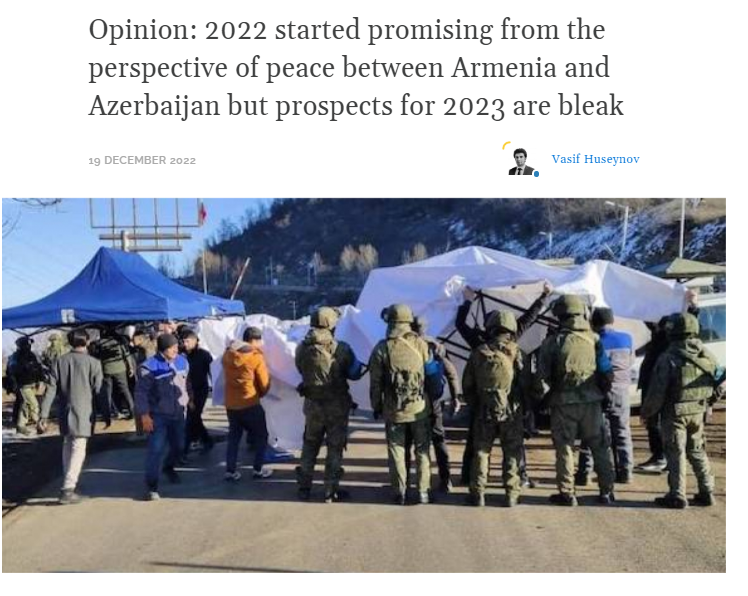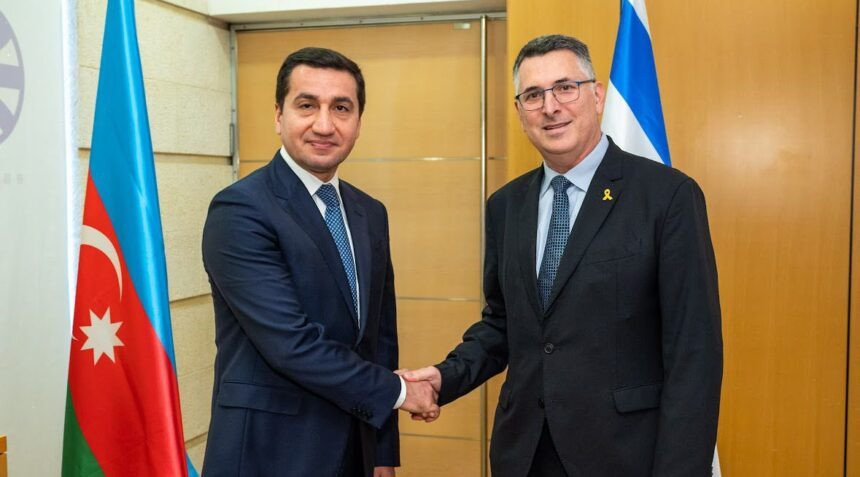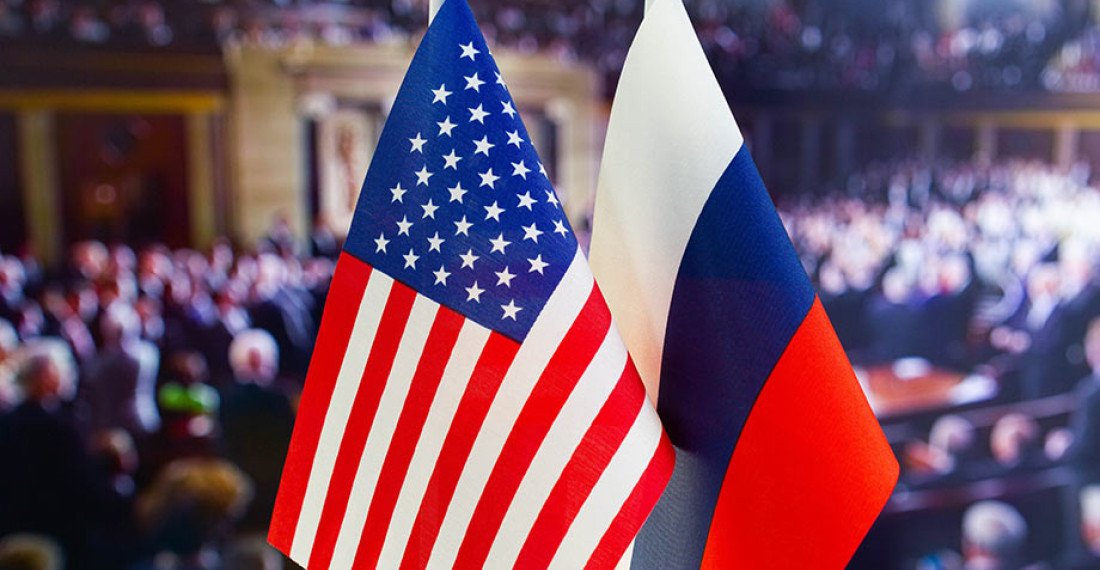Russia's attempts to show Armenia and Azerbaijan its red lines during the summit in Sochi on 31 October disrupted a positive moment in Armenia-Azerbaijan relations that had been ongoing throughout 2022. A deterioration in Azerbaijan-Iran relations has further hightened tensions in the region. "One can foresee that new escalations and hostilities will be imminent, if the peace efforts fail to deliver tangible outcomes between Armenia and Azerbaijan, and if some external actors continue to fuel the tensions in the region", writes Vasif Huseynov in this op-ed for commonspace.eu.
After a tedious 2021 – a year characterized by pandemic-related socio-economic and other challenges across the world, and in the South Caucasus by occasional armed escalations between Armenia and Azerbaijan, and gradually escalating tensions between Baku and Tehran – hope was high in the South Caucasus for a more peaceful and prosperous year in 2022.
There were grounded reasons for such expectations. Despite incidents, 2021 was much more peaceful for the Armenia-Azerbaijan relations compared to the previous years. The two sides, with the mediation of Russia, made some important advances in seeking a peaceful way forward by launching negotiations over the opening of transportation channels (January 12), for the first time de-facto recognized their interstate borders (November 26), and launched talks about the delimitation and demarcation of these borders (November 26) In December 2021 Armenian Prime Minister Nikol Pashinyan referred to the United Nations Security Council (UNSC) resolutions of 1993 as the inevitable legal basis for the talks about the status of the Karabakh region something former Armenian governments had always refused to do. These developments suggested that the two countries in conflict were on the path towards a peaceful settlement of their disputes and normalizing their relations. Although the EU and United States played some role in this process in 2021, it was primarily the Russian side that coordinated these negotiations. Baku and Yerevan were therefore treading towards a future coordinated and supported by Moscow.
The launch of Russia’s war against Ukraine in early 2022 affected the entire power balance in the wider region and brought new dynamics to the peace talks between Armenia and Azerbaijan. In parallel with the declining role of Russia as a mediator between the two sides, the respective role of the EU and United States significantly increased. This delivered a series of major breakthroughs in the negotiations as the sides established commissions on border delimitation, announced mutual understanding and agreement on the transportation links, and interacted bilaterally for the first time in many years. Even the most serious escalation since the end of the Second Karabakh War – the September 2022 clashes – which resulted in nearly 300 deaths and dozens of injuries on both sides did not put a brake to the peace talks. These clashes changed the paradigm of the conflict for the Armenian side since it became clear that a peace treaty and mutual recognition of the territorial integrity is a must not only for Azerbaijan but also for Armenia. In their aftermath – on October 6 in Prague – the sides recognized each other’s territorial integrity and reaffirmed their commitment to sign a peace treaty soon.
However, although Russia’s mediating role diminished, its influence in the region continues to be substantial. Outraged by the “hijack” of the Armenia-Azerbaijan peace process by the West, and alarmed by the prospect of Armenia’s recognition of Karabakh region as part of Azerbaijan, Moscow felt that its peacekeeping mission in the region would soon be redundant, and Russia would be elbowed out of the South Caucasus. Russia’s dispatch of the business tycoon Ruben Vardanyan to the Karabakh region of Azerbaijan was a move to prevent any dialogue between Baku and the Armenian community of the region.
Against this backdrop, we saw a deterioration in relations between Armenia and Azerbaijan towards the end of the year. The Sochi summit of October 31 was Russia’s attempt to show its red lines to the conflicting parties – a gesture which was taken seriously by the Armenian government. In its wake, the Armenian government backtracked from its earlier commitments and sabotaged the EU-mediated peace talks. In parallel, the military supplies to the separatist regime through the Lachin corridor by Armenia and Iran, the Russian support to the separatist regime, and the exploitation of the natural resources of the Karabakh region, further aggravated the situation. This strained tensions in the region as manifested by the recent protests of the Azerbaijani ecologists and the closure of the Lachin corridor.
Russia’s moves since mid-October and the reaction of the Armenian side suggest that in 2023 either Baku and Yerevan will agree on a peace treaty model supported also by Russia, or they will get stuck in prolonged negotiations marred by occasional escalations. However, developments in the Russia-Ukraine war might be a game changer also for the South Caucasus as this war has already had some implications for this region and the Armenia-Azerbaijan peace process.
Another external actor that affects the security of the South Caucasus is Iran. The saber-rattling between Baku and Tehran in the fourth quarter of 2022 presents an imminent threat for the region. Iran aggressively reacted to Azerbaijan’s deepening relations with NATO member Turkiye, and with Israel, as exemplified by Baku’s decision to open an embassy in Tel Aviv and plans to establish a Turkiye-Israel-Azerbaijan cooperation platform. Tehran seeks to counter these developments by combining its forces with Armenia – rationalizing this alliance with claims of alleged plans of Azerbaijan and its allies to cut off Iran-Armenia border. Hence, Iran provides free-of-charge military supplies to Yerevan, and is reported to have sent military servicemen to the Karabakh region of Azerbaijan to train local separatists.
Relying on its defense cooperation with Turkiye and Israel, Azerbaijan is not planning to backtrack in the face of the threats of the Iranian regime. The future of this confrontation between the sides will be a critical moment for the South Caucasus in the upcoming year.
All this suggests that the past year has brought more challenges and threats for the peace and stability of the region. Unfortunately, one can foresee that new escalations and hostilities will be imminent, if the peace efforts fail to deliver tangible outcomes between Armenia and Azerbaijan, and if some external actors continue to fuel the tensions in the region.








